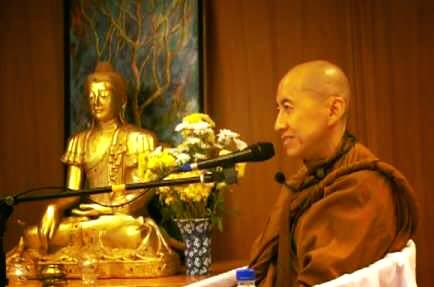
Mindfulness in Daily Living
~ Bhante Aggacitta
Most times when we are engaged in our daily activities—moving around, writing at the desk, washing dishes, etc.—it is difficult to remember to be aware and to go back to the body.
But it is a good tool to use mindfulness of the body as an anchor, to ground one in the present moment. The moment you are aware that you are thinking, note the thought, let it go and bring the mind back to the body.
"Uncovering Layers of Past Conditioning"
It is good to ask yourself, every now and then, “Where is my mind?” If it is not with the five senses—seeing, hearing, smelling, tasting, touching—then it is thinking. Check how it moves and behaves.
As the Buddha said (in SN 47:35), “a bhikkhu exercises full awareness by being aware of feelings, thoughts and perceptions as they arise, persist and disappear.”
If you are skilful in watching the mind, then you will not get caught up in thoughts and emotions.
When you do this, you become more focussed on what you are presently doing, and you can be aware of the many layers of conditioning that cause thoughts and emotions to arise.
During a recent Introduction to Monkhood Programme conducted in Sasanarakkha Buddhist Sanctuary (SBS), one of the parti-cipants put into practice what I had taught about mindfulness of ongoing activities. He petted one of the cats we have there, trying to be mindful, then went to wash his hands. At that moment, it struck him that the cause for his habitual act of washing his hands after touching a cat—although he was not deliberately thinking about it then—was because his mother had inculcated this in him when he was a child. He had an insight into the conditioning that brought about the automatic response of washing his hands after touching a cat.
Most, if not all, of our behaviour patterns are the products of past conditioning. Like robots we automatically react to situations according to such conditioned ways. Sometimes such conditioning can be the root of certain bad habits.
If we can see such conditioning, then we have a chance to undo it.
We can see the root causes of problems such as inexplicable inhibitions, phobias and grudges. We can be our own psychotherapist—watch our mind, see the conditioning that brings about such negativity and we can overcome them.
"Track the Mind and Experience Not-self (Anatta)"
The mind is a busybody. If you watch it, you can see how it moves from the eye, to the ear, etc. to thoughts commenting on almost every little thing that you can perceive through the senses.
It seems to be engaged in multitasking, but it is not. The mind is just moving very fast from object to object. See how it moves and behaves and how thoughts arise. This is how we can learn to be focused on what we are doing in the present.
...Being a busybody, the mind will be pulled to whichever sense object that is dominant. Each sense is constantly trying to overpower the others to get the attention of the mind.
If you just let it go, the mind will be taken over by the senses and it will respond with attachment, greed, lust, dislike, disappointment, etc. The moment you are aware of this, bring the mind back to the body.
However, there is a note of caution here. When we are aware of unwholesome thoughts we tend to either indulge in them or feel guilty about them.
It is important to bear in mind that the practice of mindfulness involves dis-engaging oneself from those thoughts and observing them objectively. Any reactions to those thoughts are also mental states that should be noted. In order to prevent further reactions to all those thoughts, you must immediately bring the mind back to the body.
As you continually try to watch your thoughts and emotions, one of the first insights that will dawn upon you is how fleeting and unruly the mind is. It really makes you wonder, “Who am I?”
If you can clearly see how thoughts and emotions arise due to various specific conditions you will begin to have a greater understanding of what the Buddha meant by ‘not-self’ (anatta). You experience them as a flux of transient phenomena which are discrete yet causally related.
Now the seeming solidity of your self-image (or ego) begins to melt.
You can watch them as an external observer, without identifying with them. Then even the ‘observer’ can be seen as discrete moments of awareness that arise and disappear due to specific conditioning.
This can be very liberating, as we normally identify our thoughts, emotions and awareness with our ‘self’.
~ Bhante Aggacitta
Excerpt from "Wherever you are,
whatever you’re doing, ?whenever you can BE PRESENT"

|




Return to Singapore DharmaNet